人教版(2019)选择性必修第二册Unit 5 First Aid Using language课件(共42张PPT,内镶嵌音频素材)
文档属性
| 名称 | 人教版(2019)选择性必修第二册Unit 5 First Aid Using language课件(共42张PPT,内镶嵌音频素材) | 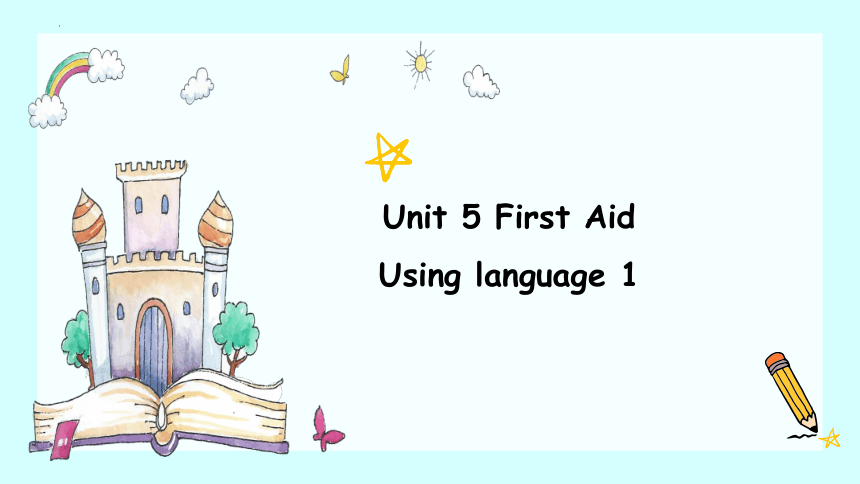 | |
| 格式 | pptx | ||
| 文件大小 | 13.3MB | ||
| 资源类型 | 教案 | ||
| 版本资源 | 人教版(2019) | ||
| 科目 | 英语 | ||
| 更新时间 | 2023-07-25 07:18:42 | ||
图片预览

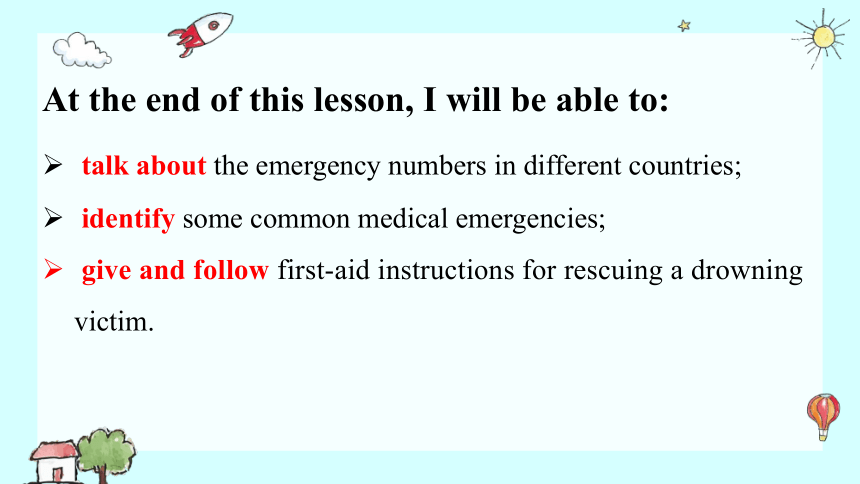
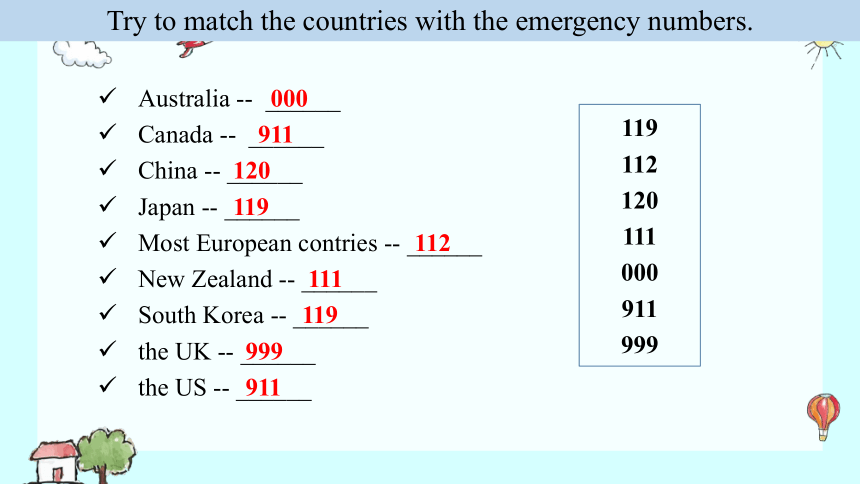
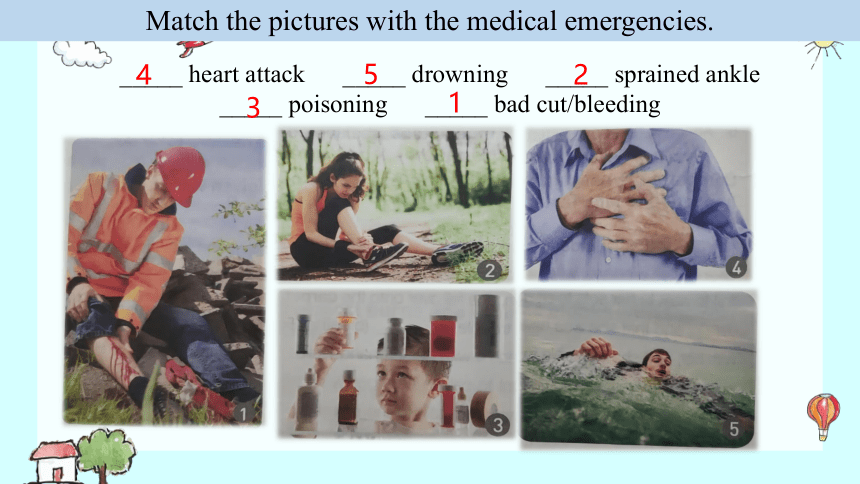
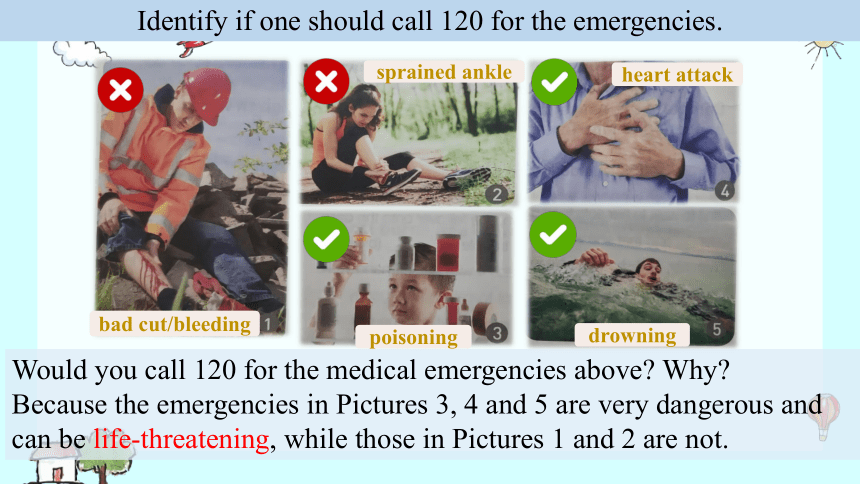
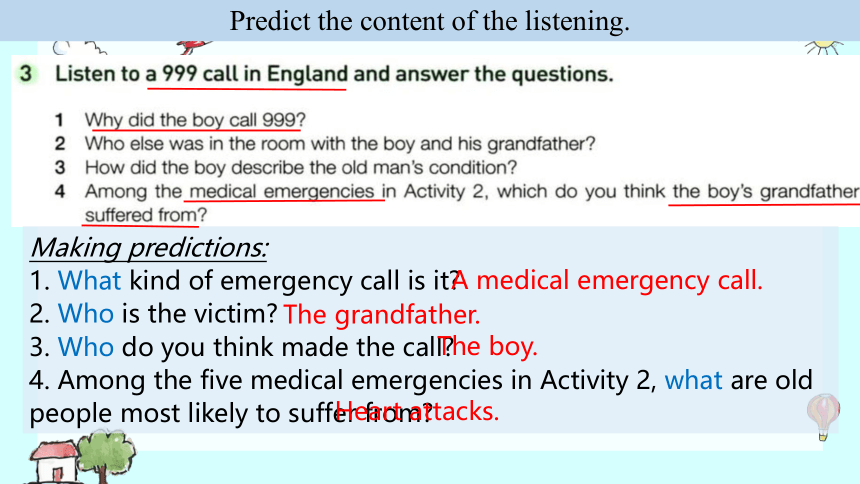
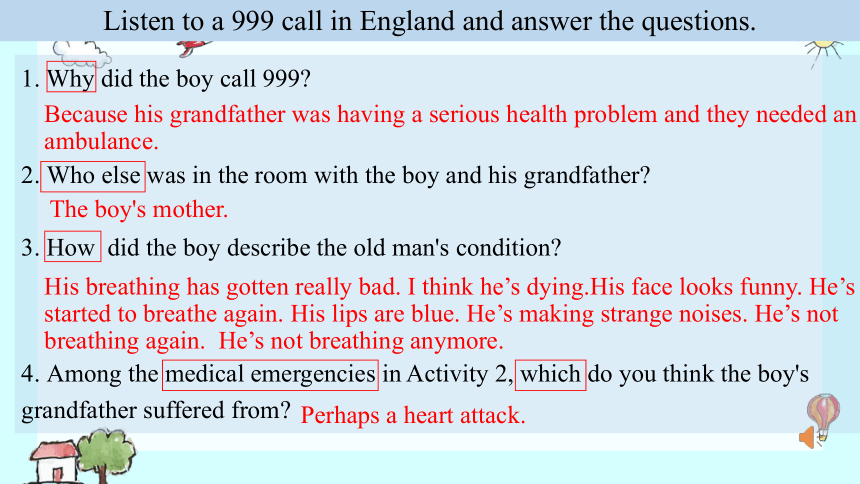
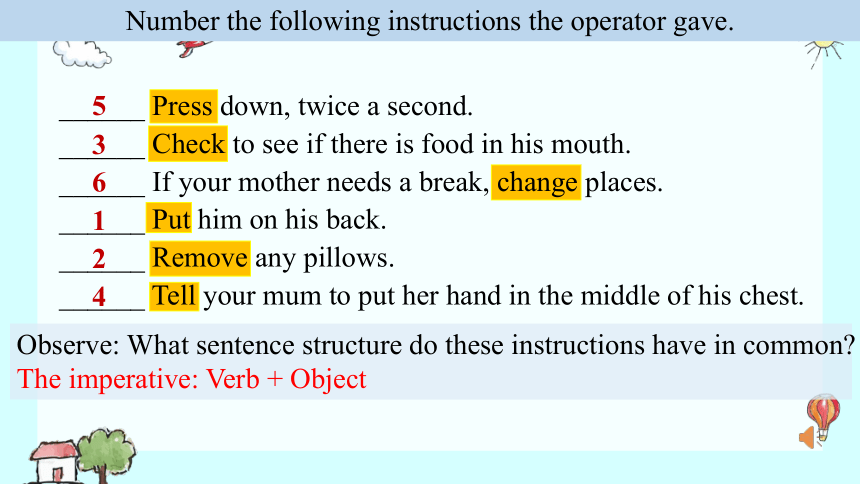
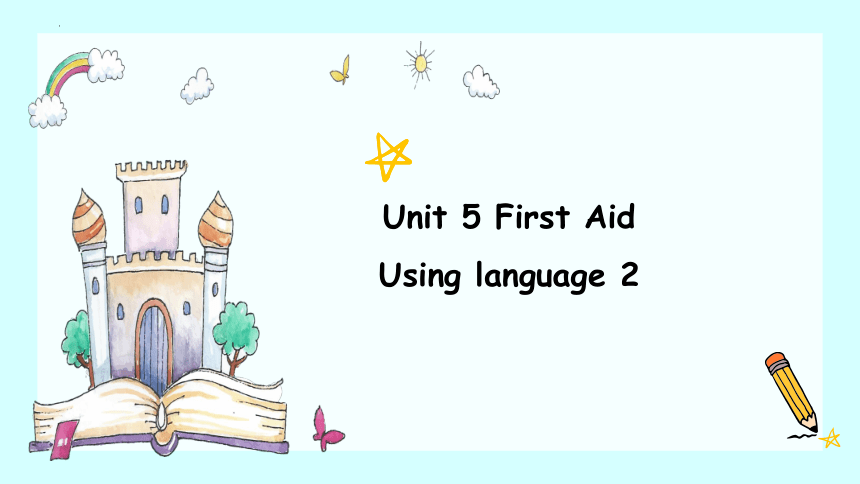
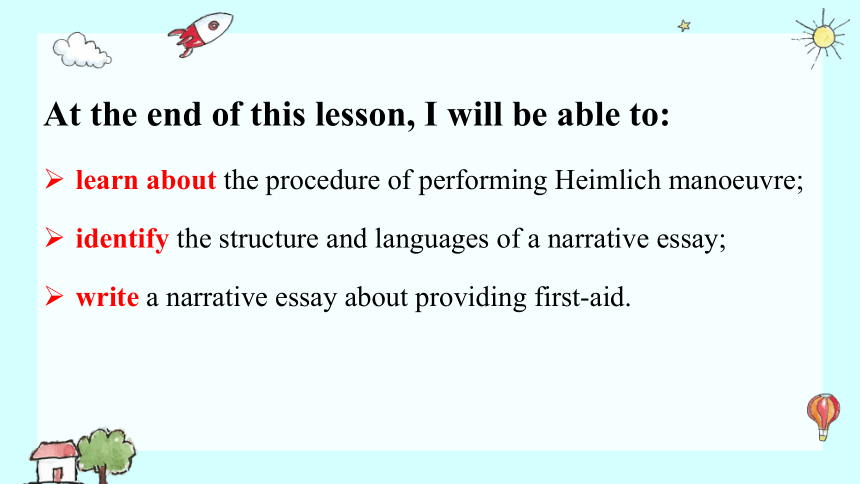
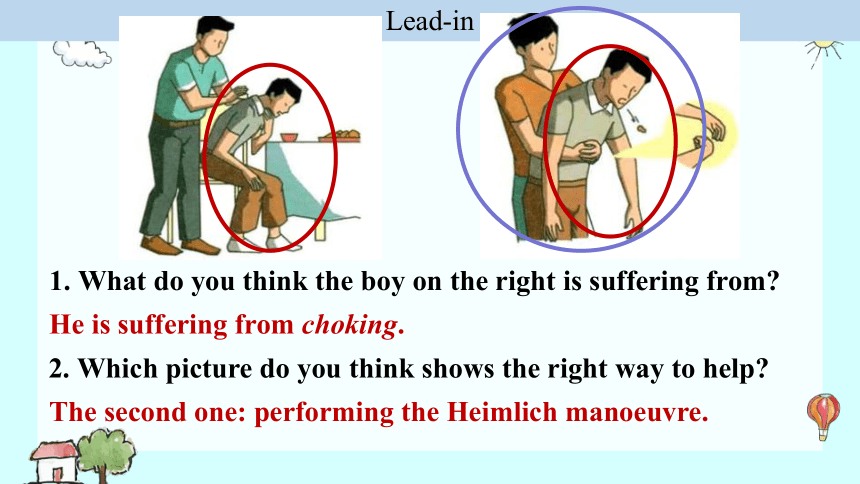
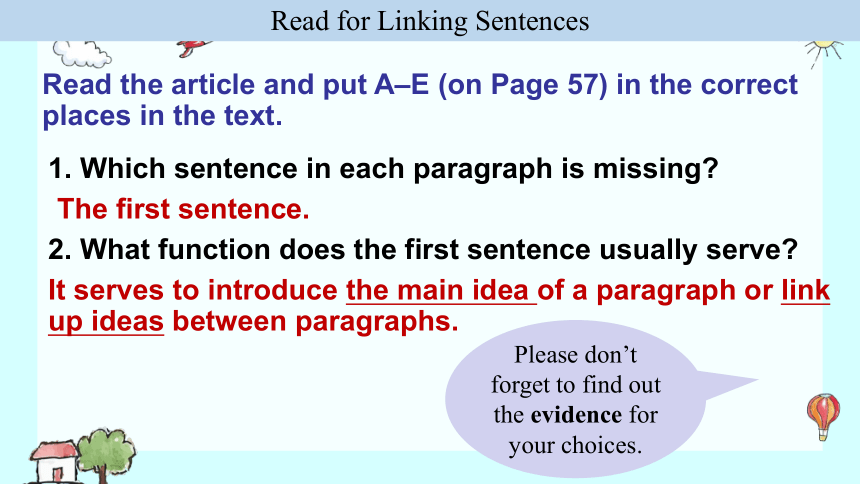
文档简介
(共42张PPT)
Unit 5 First Aid
Using language 1
At the end of this lesson, I will be able to:
talk about the emergency numbers in different countries;
identify some common medical emergencies;
give and follow first-aid instructions for rescuing a drowning victim.
Try to match the countries with the emergency numbers.
Australia -- ______
Canada -- ______
China -- ______
Japan -- ______
Most European contries -- ______
New Zealand -- ______
South Korea -- ______
the UK -- ______
the US -- ______
000
911
120
119
112
111
119
999
911
119
112
120
111
000
911
999
Match the pictures with the medical emergencies.
_____ heart attack _____ drowning _____ sprained ankle
_____ poisoning _____ bad cut/bleeding
3
1
2
4
5
Identify if one should call 120 for the emergencies.
Would you call 120 for the medical emergencies above Why
Because the emergencies in Pictures 3, 4 and 5 are very dangerous and can be life-threatening, while those in Pictures 1 and 2 are not.
bad cut/bleeding
sprained ankle
poisoning
heart attack
drowning
Predict the content of the listening.
Making predictions:
1. What kind of emergency call is it
2. Who is the victim
3. Who do you think made the call
4. Among the five medical emergencies in Activity 2, what are old people most likely to suffer from
A medical emergency call.
The grandfather.
The boy.
Heart attacks.
Listen to a 999 call in England and answer the questions.
1. Why did the boy call 999
2. Who else was in the room with the boy and his grandfather
3. How did the boy describe the old man's condition
4. Among the medical emergencies in Activity 2, which do you think the boy's grandfather suffered from
The boy's mother.
Because his grandfather was having a serious health problem and they needed an ambulance.
His breathing has gotten really bad. I think he’s dying.His face looks funny. He’s started to breathe again. His lips are blue. He’s making strange noises. He’s not breathing again. He’s not breathing anymore.
Perhaps a heart attack.
Number the following instructions the operator gave.
Observe: What sentence structure do these instructions have in common
The imperative: Verb + Object
______ Press down, twice a second.
______ Check to see if there is food in his mouth.
______ If your mother needs a break, change places.
______ Put him on his back.
______ Remove any pillows.
______ Tell your mum to put her hand in the middle of his chest.
5
3
6
1
2
4
Unit 5 First Aid
Using language 2
At the end of this lesson, I will be able to:
learn about the procedure of performing Heimlich manoeuvre;
identify the structure and languages of a narrative essay;
write a narrative essay about providing first-aid.
Lead-in
1. What do you think the boy on the right is suffering from
He is suffering from choking.
2. Which picture do you think shows the right way to help
The second one: performing the Heimlich manoeuvre.
Read for Linking Sentences
Read the article and put A–E (on Page 57) in the correct places in the text.
1. Which sentence in each paragraph is missing
The first sentence.
2. What function does the first sentence usually serve
It serves to introduce the main idea of a paragraph or link up ideas between paragraphs.
Please don’t forget to find out the evidence for your choices.
C Chen wasted no time.
A Choking victims usually have only about four minutes before they collapse and sometimes die
B If you see someone choking, first call the emergency services.
E Doing the Heimlich maneuver on a small child is not recommended
D With choking victims, every minute counts.
Read for Structure
Summarize the main ideas of each part.
Part 1 (P.1)
Part 2 (P.2)
Part 3 (P. 3, 4, 5)
Part 4 (P. 6)
Chen found Zhang Tao c at a restaurant.
The h and p of doing Heimlich manoeuvre.
Chen did the H m and the a came.
The c on the choking accident.
choking
Heilmlich
manoeuvre
ambulance
history
procedure
comments
Narrative 记叙式的
Expository 说明式的
Read for Structure
What should be included in a narrative essay
Chen found Zhang Tao choking at a restaurant.
Chen did Heimlich manoeuvre and the ambulance came.
The comments on the choking accident.
who
who
where
what
How the story ends
comments
Part1: the set-up
Part2: the development
who, what, where
the conflict: a challenge or difficulty that the characters face
Part3: the conclusion
how the story ends & comments on the story (quote)
What Chen Wei did
Read for Language
Chen Wei, a high school student in Beijing, had his dinner interrupted when he heard someone screaming from another table. A fellow diner at the restaurant, Zhang Tao, was choking on some steak. He was now holding his throat with his face turning red, while his desperate friends were slapping him on the back.
Read the 1st paragraph and find out the description of the emergency.
action
+
facial expressions/ emotions
Read for Language
Chen wasted no time. He got up and ran to Zhang’s table at once. With the help of Zhang’s friends, he was able to help Zhang to his feet. Then, standing behind Zhang, Chen did the Heimlich manoeuvre.
Read the 2nd paragraph and find out the verbs used to describe Chen’s reaction.
help sb to his/her feet: help sb stand up
What did the underlined verbs show about Chen’s reaction
His help was quick, timely (及时的) and professional.
Read for Language
If you see someone choking, first call the emergency services. Then, make sure that the victim is really choking: A choking person cannot speak. Slapping the victim’s back will often force out the obstruction. If this does not work, you can perform the Heimlich manoeuvre by standing behind him and wrapping your arms around his waist. Make a fist with one hand and place it in the upper part of his stomach. Grabbing your fist with your other hand tightly, push up and into his stomach in one motion. Continue doing this until the obstruction is forced out.
Read the 4th and find out the verbs used to describe how to deal with choking.
Before Heimlich manoeuvre
Call the emergency
Make sure that…
Slap the victim’s back
Performing Heimlich manoeuvre
Stand behind him
Wrap your arms…
Make a fist and place it…
Grab your fist
Push up and into…
Read for Language
Read the 5th paragraph and find out how to perform Heimlich manoeuvre on a small child.
Doing the Heimlich maneuver on a small child is not recommended, as you may hurt him. Instead, lay the child face down on your lap with the head lower than the rest of his body, and then give firm slaps to his upper back until he can breathe again.
precise (精确的) action
+
precise position
1.drown vi.&vt.(使)淹死;溺死;浸泡;淹没
get/be drown 被淹死
drown your sorrow 沉浸在悲伤中
drown your loneliness 处于孤独中
drown out 淹没;压过;盖过
a drowned chicken/rat 落汤鸡
1.drown vi.&vt.(使)淹死;溺死;浸泡;淹没
Two children got drowned after falling into the river.
两个孩子掉进河里淹死了。
She turned up the radio to drown out the noise from next door.
她开大了收音机的音量以压过隔壁房间的吵闹声。
Caught in the rain, he was wet all over like a drowned rat.
他被雨淋得浑身湿透,像只落汤鸡。
1.drown vi.&vt.(使)淹死;溺死;浸泡;淹没
(1)He had attempted to rescue the __________ (drown) man.
(2)Forty-eight people have __________ (drown) in the storm at sea.
drowned
drowning
2.bleeding n.流血;失血
(1)severe/heavy bleeding 严重/大量出血
(2)bleed vi.& vt.流血;榨取
bleed to death 失血而死
bleed sb.dry 榨取某人所有的钱
(3)blood n.血液;血统
blood type 血型
2.bleeding n.流血;失血
She’s going to bleed to death!
她会流血而死!
His head had hit the wall and was bleeding.
他的头撞到了墙上,正在流血。
In the novel, the two sons bleed him dry.
在小说中,两个儿子榨干了他所有的钱。
2.bleeding n.流血;失血
(1)Without getting first aid, he would slowly bleed __________ death.
(2)Press firmly on the wound to stop the __________ (bleed).
(3)I got a scratch on my face and it __________ (bleed) a little.
to
bleeding
bled
3.panic vi.&vt.(panicked, panicked)(使)惊慌 n.惊恐;恐慌
(1)panic sb.into doing sth.使某人仓促做某事
(2)panic n.惊慌;恐慌
in a panic 惊惶地;惊慌地
get into a panic 陷入恐慌
a wave of panic 一阵恐慌
in a state of panic 处于惊恐状态
3.panic vi.&vt.(panicked, panicked)(使)惊慌 n.惊恐;恐慌
(1)panic sb.into doing sth.使某人仓促做某事
(2)panic n.惊慌;恐慌
in a panic 惊惶地;惊慌地
get into a panic 陷入恐慌
a wave of panic 一阵恐慌
in a state of panic 处于惊恐状态
(1)I __________ (panic) when I saw smoke coming out of the engine.
panicked
4.interrupt vi.&vt.打断;打扰 vt.使暂停;使中断
interruption n.打断;中止
without interruption 连续地;不断地
interrupt 侧重打断某活动的过程,使其不能进行下去
disturb 侧重扰乱某种状态或秩序
4.interrupt vi.&vt.打断;打扰 vt.使暂停;使中断
(1)He has ______ (interrupt) his holiday in Spain to return to London.
(2)The birth of her son was a minor ______ (interrupt) to her career.
interruption
interrupted
5.desperate adj.绝望的;孤注一掷的;非常需要的
(1)be desperate for...非常需要……
be desperate to do sth.非常想做某事
in desperate need of...非常需要……
(2)desperately adv.拼命地;绝望地;极度地
(3)desperation n.绝望
in desperation 绝望地;不顾一切地
5.desperate adj.绝望的;孤注一掷的;非常需要的
They desperately wanted a child. 他们非常想要一个孩子。
I was absolutely desperate to see her.
我极想见到她。
The children are in desperate need of love and attention.
这些孩子非常需要爱心和关怀。
In desperation, she called Louise and asked for her help.
在走投无路的情况下,她给路易丝打了个电话请她帮忙。
5.desperate adj.绝望的;孤注一掷的;非常需要的
(1)He took a deep breath, __________ (desperate) trying to keep calm.
(2)There are hundreds of people desperate __________ (adopt) a child.
(3)He is in heavy debt and desperate __________ money.
for
desperately
to adopt
6.rescue sb.from...把某人从……中救出来
You rescued me from an embarrassing situation.
我正感到尴尬,你为我解了围。
6.rescue sb.from...把某人从……中救出来
(1)Helicopters __________ (rescue) nearly 20 people from the roof of the burning building yesterday.
(2)He had rescued her __________ a terrible life.
from
rescued
7.help sb.to one’s feet 帮助某人站起身来
on foot 步行;在进行中
rise to one’s feet 站起来
jump to one’s feet 跳起来
set foot in 踏进;进入;涉足于
stand on one’s own two feet 独立自主;依靠自己
struggle to one’s feet 挣扎着站起来
at the foot of...在……脚下
7.help sb.to one’s feet 帮助某人站起身来
He struggled to his feet and walked to the door.
他挣扎着站起来,向门口走去。
They jumped to their feet when hearing the good news.
听到这个好消息,他们都跳了起来。
7.help sb.to one’s feet 帮助某人站起身来
(1)The girl helped Karl __________ his feet, and took him to a restaurant.
(2)He is trying his best to stand __________ his own two feet.
on
to
8.face down 面朝下
(1)face down 面朝下
face up 面朝上;正面朝上
face to face 面对面地
make a face/faces 做鬼脸
in the face of...面对;在……面前
lose face 丢脸
(2)be faced with 面临;面对 face up to 勇敢面对
8.face down 面朝下
We are faced with a serious problem.
我们面临着一个严重问题。
He was then pushed face down on the pavement.
接着他被一把推倒,脸朝下趴在了人行道上。
8.face down 面朝下
(1)_____ (face) with these problems, let’s all do our best.
(2)____ the face of difficulties, he’s completely unafraid.
In
Faced
See you
Unit 5 First Aid
Using language 1
At the end of this lesson, I will be able to:
talk about the emergency numbers in different countries;
identify some common medical emergencies;
give and follow first-aid instructions for rescuing a drowning victim.
Try to match the countries with the emergency numbers.
Australia -- ______
Canada -- ______
China -- ______
Japan -- ______
Most European contries -- ______
New Zealand -- ______
South Korea -- ______
the UK -- ______
the US -- ______
000
911
120
119
112
111
119
999
911
119
112
120
111
000
911
999
Match the pictures with the medical emergencies.
_____ heart attack _____ drowning _____ sprained ankle
_____ poisoning _____ bad cut/bleeding
3
1
2
4
5
Identify if one should call 120 for the emergencies.
Would you call 120 for the medical emergencies above Why
Because the emergencies in Pictures 3, 4 and 5 are very dangerous and can be life-threatening, while those in Pictures 1 and 2 are not.
bad cut/bleeding
sprained ankle
poisoning
heart attack
drowning
Predict the content of the listening.
Making predictions:
1. What kind of emergency call is it
2. Who is the victim
3. Who do you think made the call
4. Among the five medical emergencies in Activity 2, what are old people most likely to suffer from
A medical emergency call.
The grandfather.
The boy.
Heart attacks.
Listen to a 999 call in England and answer the questions.
1. Why did the boy call 999
2. Who else was in the room with the boy and his grandfather
3. How did the boy describe the old man's condition
4. Among the medical emergencies in Activity 2, which do you think the boy's grandfather suffered from
The boy's mother.
Because his grandfather was having a serious health problem and they needed an ambulance.
His breathing has gotten really bad. I think he’s dying.His face looks funny. He’s started to breathe again. His lips are blue. He’s making strange noises. He’s not breathing again. He’s not breathing anymore.
Perhaps a heart attack.
Number the following instructions the operator gave.
Observe: What sentence structure do these instructions have in common
The imperative: Verb + Object
______ Press down, twice a second.
______ Check to see if there is food in his mouth.
______ If your mother needs a break, change places.
______ Put him on his back.
______ Remove any pillows.
______ Tell your mum to put her hand in the middle of his chest.
5
3
6
1
2
4
Unit 5 First Aid
Using language 2
At the end of this lesson, I will be able to:
learn about the procedure of performing Heimlich manoeuvre;
identify the structure and languages of a narrative essay;
write a narrative essay about providing first-aid.
Lead-in
1. What do you think the boy on the right is suffering from
He is suffering from choking.
2. Which picture do you think shows the right way to help
The second one: performing the Heimlich manoeuvre.
Read for Linking Sentences
Read the article and put A–E (on Page 57) in the correct places in the text.
1. Which sentence in each paragraph is missing
The first sentence.
2. What function does the first sentence usually serve
It serves to introduce the main idea of a paragraph or link up ideas between paragraphs.
Please don’t forget to find out the evidence for your choices.
C Chen wasted no time.
A Choking victims usually have only about four minutes before they collapse and sometimes die
B If you see someone choking, first call the emergency services.
E Doing the Heimlich maneuver on a small child is not recommended
D With choking victims, every minute counts.
Read for Structure
Summarize the main ideas of each part.
Part 1 (P.1)
Part 2 (P.2)
Part 3 (P. 3, 4, 5)
Part 4 (P. 6)
Chen found Zhang Tao c at a restaurant.
The h and p of doing Heimlich manoeuvre.
Chen did the H m and the a came.
The c on the choking accident.
choking
Heilmlich
manoeuvre
ambulance
history
procedure
comments
Narrative 记叙式的
Expository 说明式的
Read for Structure
What should be included in a narrative essay
Chen found Zhang Tao choking at a restaurant.
Chen did Heimlich manoeuvre and the ambulance came.
The comments on the choking accident.
who
who
where
what
How the story ends
comments
Part1: the set-up
Part2: the development
who, what, where
the conflict: a challenge or difficulty that the characters face
Part3: the conclusion
how the story ends & comments on the story (quote)
What Chen Wei did
Read for Language
Chen Wei, a high school student in Beijing, had his dinner interrupted when he heard someone screaming from another table. A fellow diner at the restaurant, Zhang Tao, was choking on some steak. He was now holding his throat with his face turning red, while his desperate friends were slapping him on the back.
Read the 1st paragraph and find out the description of the emergency.
action
+
facial expressions/ emotions
Read for Language
Chen wasted no time. He got up and ran to Zhang’s table at once. With the help of Zhang’s friends, he was able to help Zhang to his feet. Then, standing behind Zhang, Chen did the Heimlich manoeuvre.
Read the 2nd paragraph and find out the verbs used to describe Chen’s reaction.
help sb to his/her feet: help sb stand up
What did the underlined verbs show about Chen’s reaction
His help was quick, timely (及时的) and professional.
Read for Language
If you see someone choking, first call the emergency services. Then, make sure that the victim is really choking: A choking person cannot speak. Slapping the victim’s back will often force out the obstruction. If this does not work, you can perform the Heimlich manoeuvre by standing behind him and wrapping your arms around his waist. Make a fist with one hand and place it in the upper part of his stomach. Grabbing your fist with your other hand tightly, push up and into his stomach in one motion. Continue doing this until the obstruction is forced out.
Read the 4th and find out the verbs used to describe how to deal with choking.
Before Heimlich manoeuvre
Call the emergency
Make sure that…
Slap the victim’s back
Performing Heimlich manoeuvre
Stand behind him
Wrap your arms…
Make a fist and place it…
Grab your fist
Push up and into…
Read for Language
Read the 5th paragraph and find out how to perform Heimlich manoeuvre on a small child.
Doing the Heimlich maneuver on a small child is not recommended, as you may hurt him. Instead, lay the child face down on your lap with the head lower than the rest of his body, and then give firm slaps to his upper back until he can breathe again.
precise (精确的) action
+
precise position
1.drown vi.&vt.(使)淹死;溺死;浸泡;淹没
get/be drown 被淹死
drown your sorrow 沉浸在悲伤中
drown your loneliness 处于孤独中
drown out 淹没;压过;盖过
a drowned chicken/rat 落汤鸡
1.drown vi.&vt.(使)淹死;溺死;浸泡;淹没
Two children got drowned after falling into the river.
两个孩子掉进河里淹死了。
She turned up the radio to drown out the noise from next door.
她开大了收音机的音量以压过隔壁房间的吵闹声。
Caught in the rain, he was wet all over like a drowned rat.
他被雨淋得浑身湿透,像只落汤鸡。
1.drown vi.&vt.(使)淹死;溺死;浸泡;淹没
(1)He had attempted to rescue the __________ (drown) man.
(2)Forty-eight people have __________ (drown) in the storm at sea.
drowned
drowning
2.bleeding n.流血;失血
(1)severe/heavy bleeding 严重/大量出血
(2)bleed vi.& vt.流血;榨取
bleed to death 失血而死
bleed sb.dry 榨取某人所有的钱
(3)blood n.血液;血统
blood type 血型
2.bleeding n.流血;失血
She’s going to bleed to death!
她会流血而死!
His head had hit the wall and was bleeding.
他的头撞到了墙上,正在流血。
In the novel, the two sons bleed him dry.
在小说中,两个儿子榨干了他所有的钱。
2.bleeding n.流血;失血
(1)Without getting first aid, he would slowly bleed __________ death.
(2)Press firmly on the wound to stop the __________ (bleed).
(3)I got a scratch on my face and it __________ (bleed) a little.
to
bleeding
bled
3.panic vi.&vt.(panicked, panicked)(使)惊慌 n.惊恐;恐慌
(1)panic sb.into doing sth.使某人仓促做某事
(2)panic n.惊慌;恐慌
in a panic 惊惶地;惊慌地
get into a panic 陷入恐慌
a wave of panic 一阵恐慌
in a state of panic 处于惊恐状态
3.panic vi.&vt.(panicked, panicked)(使)惊慌 n.惊恐;恐慌
(1)panic sb.into doing sth.使某人仓促做某事
(2)panic n.惊慌;恐慌
in a panic 惊惶地;惊慌地
get into a panic 陷入恐慌
a wave of panic 一阵恐慌
in a state of panic 处于惊恐状态
(1)I __________ (panic) when I saw smoke coming out of the engine.
panicked
4.interrupt vi.&vt.打断;打扰 vt.使暂停;使中断
interruption n.打断;中止
without interruption 连续地;不断地
interrupt 侧重打断某活动的过程,使其不能进行下去
disturb 侧重扰乱某种状态或秩序
4.interrupt vi.&vt.打断;打扰 vt.使暂停;使中断
(1)He has ______ (interrupt) his holiday in Spain to return to London.
(2)The birth of her son was a minor ______ (interrupt) to her career.
interruption
interrupted
5.desperate adj.绝望的;孤注一掷的;非常需要的
(1)be desperate for...非常需要……
be desperate to do sth.非常想做某事
in desperate need of...非常需要……
(2)desperately adv.拼命地;绝望地;极度地
(3)desperation n.绝望
in desperation 绝望地;不顾一切地
5.desperate adj.绝望的;孤注一掷的;非常需要的
They desperately wanted a child. 他们非常想要一个孩子。
I was absolutely desperate to see her.
我极想见到她。
The children are in desperate need of love and attention.
这些孩子非常需要爱心和关怀。
In desperation, she called Louise and asked for her help.
在走投无路的情况下,她给路易丝打了个电话请她帮忙。
5.desperate adj.绝望的;孤注一掷的;非常需要的
(1)He took a deep breath, __________ (desperate) trying to keep calm.
(2)There are hundreds of people desperate __________ (adopt) a child.
(3)He is in heavy debt and desperate __________ money.
for
desperately
to adopt
6.rescue sb.from...把某人从……中救出来
You rescued me from an embarrassing situation.
我正感到尴尬,你为我解了围。
6.rescue sb.from...把某人从……中救出来
(1)Helicopters __________ (rescue) nearly 20 people from the roof of the burning building yesterday.
(2)He had rescued her __________ a terrible life.
from
rescued
7.help sb.to one’s feet 帮助某人站起身来
on foot 步行;在进行中
rise to one’s feet 站起来
jump to one’s feet 跳起来
set foot in 踏进;进入;涉足于
stand on one’s own two feet 独立自主;依靠自己
struggle to one’s feet 挣扎着站起来
at the foot of...在……脚下
7.help sb.to one’s feet 帮助某人站起身来
He struggled to his feet and walked to the door.
他挣扎着站起来,向门口走去。
They jumped to their feet when hearing the good news.
听到这个好消息,他们都跳了起来。
7.help sb.to one’s feet 帮助某人站起身来
(1)The girl helped Karl __________ his feet, and took him to a restaurant.
(2)He is trying his best to stand __________ his own two feet.
on
to
8.face down 面朝下
(1)face down 面朝下
face up 面朝上;正面朝上
face to face 面对面地
make a face/faces 做鬼脸
in the face of...面对;在……面前
lose face 丢脸
(2)be faced with 面临;面对 face up to 勇敢面对
8.face down 面朝下
We are faced with a serious problem.
我们面临着一个严重问题。
He was then pushed face down on the pavement.
接着他被一把推倒,脸朝下趴在了人行道上。
8.face down 面朝下
(1)_____ (face) with these problems, let’s all do our best.
(2)____ the face of difficulties, he’s completely unafraid.
In
Faced
See you
